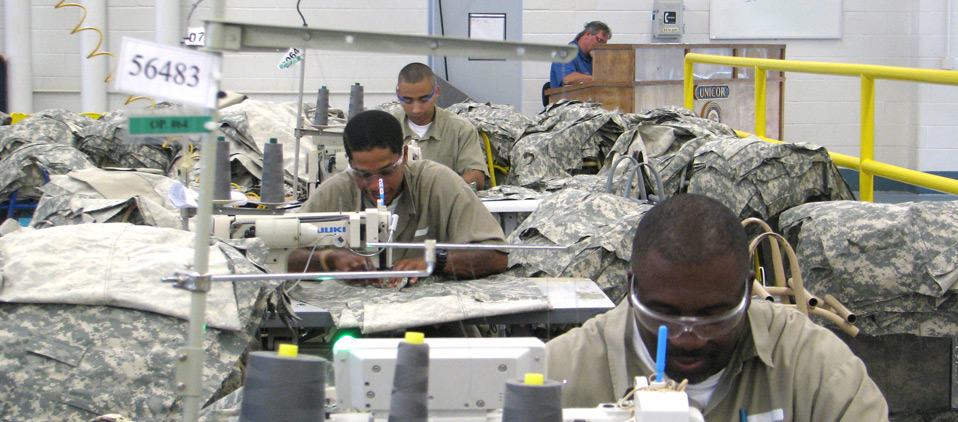On Thursday, the Justice Department issued a memo in which it came to an obvious and belated conclusion: privately run, for-profit prisons are “less safe and less effective at providing correctional services than those run by the government.” As a result, the DOJ plans to stop renewing and scale down current contracts with corporations that run these facilities. The director of the ACLU’s National Prison Project calls this decision a “startling reversal” that is both “historic and groundbreaking.” While this decision is certainly a wonderful step in a positive direction, understanding it means understanding what private prisons are, how they function, and who’s using them. (Also: the government only makes use of thirteen privately run facilities.)
Prison reform efforts are enjoying a renewed national interest. Hillary Clinton’s campaign website has an entire page, within its “Issues” heading, dedicated to criminal justice reform. But even as we become more aware of the stark facts relating to how the U.S. targets, imprisons, and abuses its most vulnerable citizens, and even as the mothers of Trayvon Martin, Sandra Bland, and Michael Brown took the stage at the Democratic National Convention, many people still don’t know how closely intertwined their daily lives are with our enormous carceral system.
According to Prison Legal News, “In 2014, the nation’s two largest private prison companies alone took in over $3.3 billion in gross revenue,” meaning that the labor of prisoners is now part of many of the products and services Americans use daily. Mass imprisonment, through its privatization, has become intertwined with our way of life, and looking closely at the private, for-profit industry shows the extent to which mass imprisonment is a natural outgrowth of core American values, including our love of wealth and big-business capitalism.
The assumption that “criminal justice reform” alone can significantly change the innumerable problems that mass imprisonment creates and exacerbates seems at best grossly naive and, at worst, a gruesomely cynical distraction. Criminal justice reform alone will do nothing to change this reality for the better so long as those reforms—whatever they may be—exist within our dehumanizing, profit-above-all, moral, economic, and political wasteland. In a country with a constitution that explicitly permits slavery as punishment for a crime, reforming so-called “criminal justice” would actually mean, at the very least, making important changes to the founding documents and to the basic ways in which business is practiced. In other words, it means changing capitalism and our understandings of crime, freedom, and citizenship.
* * *
The Sentencing Project reports that “in 2010, private prisons held 128,195 individuals, representing eight percent of America’s total prison population and an 80 percent increase compared to 1999.” According to Prison Legal News, private prisons house around 9% of all state and federal prisoners. It’s important, too, to understand that the line dividing “public” from “private” isn’t always so distinct: as of the end of 2013, a report from the Human Rights Defense Center found that “private prisons were utilized by the federal government and 24 states, of which some have become dependent on privatization to maintain their prison population levels. Seven states have 20% or more of their prisoners in for-profit facilities, including New Mexico (43.6%), Montana (40.1%) and Hawaii (25.2%). The federal Bureau of Prisons houses 19% of its population in private prisons.” What these numbers mean is that imprisonment has become a business model; the result is that individuals, corporations, and entire industries have come to have a vested interest in working to make sure more and more people are locked away.
These companies don’t usually have to abide by the Freedom of Information Act or public records laws, and as a result, there is a scarcity of information about how they operate. There are many great groups doing research and publishing information, though, and one especially helpful resource for understanding the private prison industry is Prison Profiteers—a collection of critical essays published in 2007 that details the extent to which the private prison industry is interconnected with healthcare, transportation, foodservice, technology, telecommunications, construction, politics, and popular culture.
From Prison Profiteers we learn how large corporations like McDonald’s and Starbucks use prisoners as an incredibly cheap labor pool. We learn how Verizon and AT&T price-gouge on collect calls from prisoners (a practice which decimates outside social support for prisoners, making readjustment to life outside of prison even more difficult and increasing recidivism). We learn about how these companies lobby for lawmaking practices that are likely to increase rates of imprisonment, and against those that would decrease it. We learn that “Two-Thirds of Private Prison Contracts Include ‘Lockup Quotas.’” The book takes readers on a tour almost too absurd to be believed, from evangelical Christianity’s ties to prison education, industry-wide annual conferences where speakers refer to prisoners with disabilities as “the assholes,” to the close ties between the leaders of these corporations and politicians.
Last year, The Nation ran a piece titled “How Scott Walker Built a Career Sending Wisconsin Inmates to Private Prisons,” which details how CCA was a major donor to Walker’s campaign and worked to influence legislation he passed. Florida’s Marco Rubio is another example of the extent to which these companies seek to use politicians in order to create favorable economic and legal circumstances for their business operations. As Michael Cohen, writing for the Washington Post, puts it: “The U.S. senator has a history of close ties to the nation’s second-largest for-profit prison company, GEO Group, stretching back to his days as speaker of the Florida House of Representatives. While Rubio was leading the House, GEO was awarded a state government contract for a $110 million prison soon after Rubio hired an economic consultant who had been a trustee for a GEO real estate trust. Over his career, Rubio has received nearly $40,000 in campaign donations from GEO, making him the Senate’s top career recipient of contributions from the company.”
* * *
As Americans become more aware of both mass incarceration and the increasing privatization of imprisonment, along with the short and long-term effects of these practices, a gradual shift away from some of the more deplorable routines, like solitary confinement and flagrantly racist sentencing laws, has been set in motion. President Obama has banned solitary confinement—but only for juveniles, and, of those, only juveniles being held in federal prisons. His op-ed is worth reading, and it’s a good thing that, going forward, fewer people will be subjected to this cruel, damaging form of punishment. But it’s important to remember, as with the DOJ’s memo on Thursday, how small this important gesture is, especially when not all U.S. prisons are federally operated.
Scholars have traced mass incarceration’s close ties to the war on drugs, which created policies and practices that for decades led to the enormous expansion of prisons. But now that so many businesses have found success through latching onto this growth, mass imprisonment seems more entrenched than ever. How far away from current practices will we be able to move when imprisoning people is so good for so many different businesses? Inmates process beef for McDonald’s and Wendy’s; they package the Starbucks Coffee we drink every day. If you own an investment portfolio, you might find it includes stock in American Correctional Association (ACA), Corrections Corporation of America (CCA), and The GEO Group, all of which imprison people for profit and are publicly traded. Imprisonment has become just another normalized business practice: it has embedded itself into the daily routines of our lives. Changing it will mean much more than changing criminal justice given that prisons make money and so much of our political, social, and personal orientation orbits around glorifying profitability.
The New York Times recently featured a long piece detailing the horrific deaths (and suffering, and amputations) of those being transported by a private company—Prisoner Transportation Services of America. To save money, they skimp on training, maintenance, and the drivers are incentivized to complete the trips with as few stops as possible. Passengers sit in their excrement, are ignored when they complain about pain or ask for their medications. Some of them die.
In other words, so that some may profit, life’s necessities—water, health, access to medicine, freedom from abuse—have all been intentionally placed out of reach. More disturbingly, in the name of business, there are those that—at Trump’s rallies, for example—call for the large-scale implementation of exactly the kinds of discriminatory, business-minded practices that bring these horrors into being. “We’re not closing GITMO, we’re going to fill it up,” says Trump.
This “fill it up” mentality has become such a regular part of life that we’ve not only come to expect it, but have developed a culture around celebrating it. We celebrate business. We have a presidential candidate who many see as a fit candidate for office because he is supposed to “make great deals.” We’re so interested in creating deals that work to our own advantage that we often turn our derision toward the poor(er than us) and might not feel the least bit dehumanized, when, in a corporate meeting, a manager encourages us to think, for example, about our “personal brand.” We think of ourselves in terms of our marketability, as products. When educators are told, as I once was, that teachers are “on the front lines of product delivery” (a turn of phrase which nicely imagines education as violence, with students presumably the enemies), it’s just business as usual. Education and human well-being are subservient to money making, without which there is no value, no meaning. We must start resisting capitalism’s proteanism, understanding it’s ability to grow and cannibalize itself, to reject and absorb at will, its ability to adapt.
Like capitalism, people, too, adapt to their circumstances. Often this happens in beautiful, creative, and profound ways. If products and profits matter more than people, then the smartest, most logical response is to stop being a person and, instead, envision yourself—and others—as objects. People don’t have value, but if you can make yourself marketable, you might be considered worthwhile enough by an employer to be able to afford healthcare and a place to live. If employers do not see you as hirable—if your skin isn’t the right color, if the market doesn’t currently have any hunger for your skills, or if you’ve been robbed of all opportunity to practice and develop skills to begin with—then the private prison industry can turn you into a useful product.
All this might help us see the prison industry as something other than a predatory, amoral celebration of pain and despair. It’s just another smart, creative adaptation. It thrives on the same principles that cause black and brown people to be subject to higher rates of poverty, unemployment, underfunded schools, violence of all kinds, and terrorizing policing practices. It makes use of our current value system and economic system to great effect. In some towns, working at the prison is one of few options. But whether you’re the guard who gets to leave when her shift is over or the inmate who has to stay, you’re an object.
Understanding that the private prison industry is a perfect, regular outgrowth of the way we’ve already been doing business means that, even if we don’t like it, making substantial changes to how it works means changing more than sentencing laws, policing practices, or our educational system. It means re-thinking who we are from the ground up, reconsidering what we value, what makes living worthwhile. It means developing a culture that recognizes and values all people.
Eric Van Hoose is a doctoral student at the University of Cincinnati. He writes for Full Stop about prisons and popular culture.
This post may contain affiliate links.








